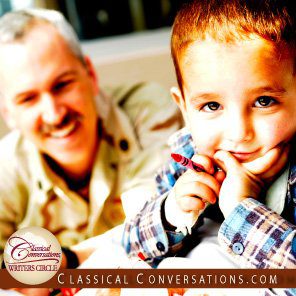When I hear the words homeschool and leisure together, I don’t think of them as a fit. I’m not sure it’s possible to conceive of parenthood and leisure in the same sentence. Over the course of this summer, however, I’ve been convicted to rethink my conception of both school and leisure. A number of my friends were reading Leisure: The Basis of Culture by Josef Pieper. Since I rarely meet a book I don’t like, I purchased a copy at a conference.
Did you know that our word for school actually means leisure? On the first page, Pieper talks about the possibility of us rebuilding the Western tradition. He argues that the foundation of our culture is leisure, “that much, at least, can be learnt from the first chapter of Aristotle’s Metaphysics. And even the history of the word attests the fact: for leisure in Greek is skole, and in Latin scola, the English ‘school’” (19). This was such an astounding revelation that I had to set the book aside for a day to contemplate what this could possibly mean.
I could not conceive of how leisure could be associated with the daily task in front of me. After all, I have to teach four children of wildly varying ages—fourteen, twelve, eight, and four. During the day, I must teach history, science, literature, Bible, spelling, math, handwriting, phonics, and Latin. Then, of course, there are the fine arts and . . . after that, of course, I must prepare meals, tend to my home, and drive everyone to activities. I couldn’t figure it out, but I wasn’t ready to give up on the book, so I tried again.
Turns out, our culture has no understanding of the classical conception of leisure. Moderns are trapped in a culture that views the weekends as much-needed rest to “recharge the batteries” in order to return to work on Monday. In other words, the focus of life has become work. This can be clearly seen in the questions we most often ask upon meeting a new acquaintance. We rarely ask, “What are your interests?” Instead, we ask, “What do you do?” We never mean, “What do you do in your leisure time?” We mean, “What do you do for a living?” We ask our older students not, “What are your passions?” but “What will you major in?” We even ask our youngest children, “What do you want to be when you grow up?” (Notice that we don’t ask them who they want to become).
Our questions demonstrate that our identity is intimately tied to our work. In the classical world, the focus of life was not work, but leisure. Aristotle put it this way, “we are unleisurely in order to have leisure” (20). In other words, we work to have leisure. This is the dead opposite view of “we rest in order to work again.”
So far, so good, but what does this have to do with leisure and school? The ancient world divided the arts into theartes liberales and the artes serviles—in other words, the “liberal arts” and the “practical arts.” The liberal arts formed the basis of the schools. They understood that education meant time to contemplate the beauty of poetry and music, to appreciate the works of others and to compose pieces of one’s own. Today, even those of us trying to reclaim classical, Christian education will slip into the contemporary mindset to ask, “How will the study of poetry, particularly writing original poems, help my student get a job?” Instead, perhaps we should ask, “How can I feed my child’s soul with time to read and write poetry, to draw, to paint, to contemplate God’s goodness?”
Is it possible for us to turn back the tide? Can we begin to think of ourselves in terms other than our value as productive workers? Can we once again learn to share music and literature together? To set aside leisure time to feast on good food and great ideas together?
This year, our family plans to enjoy Norse mythology, Shakespeare, and poetry together, and to explore classical music at meal times. I have no formal syllabus or checklist, just a handful of good books, music CDs, and time.
How can you and your family celebrate life and leisure together this year?
Maybe it is as simple as adding music and poetry, literature and plays, not to our curriculum as another item on a checklist, but to our day as part of what it means to be human. Maybe it is as simple as not racing through our education, rushing our young child into Challenge A, just to meet the requirements as quickly as possible for credits and certification.
Let’s redefine education and leisure this fall.




